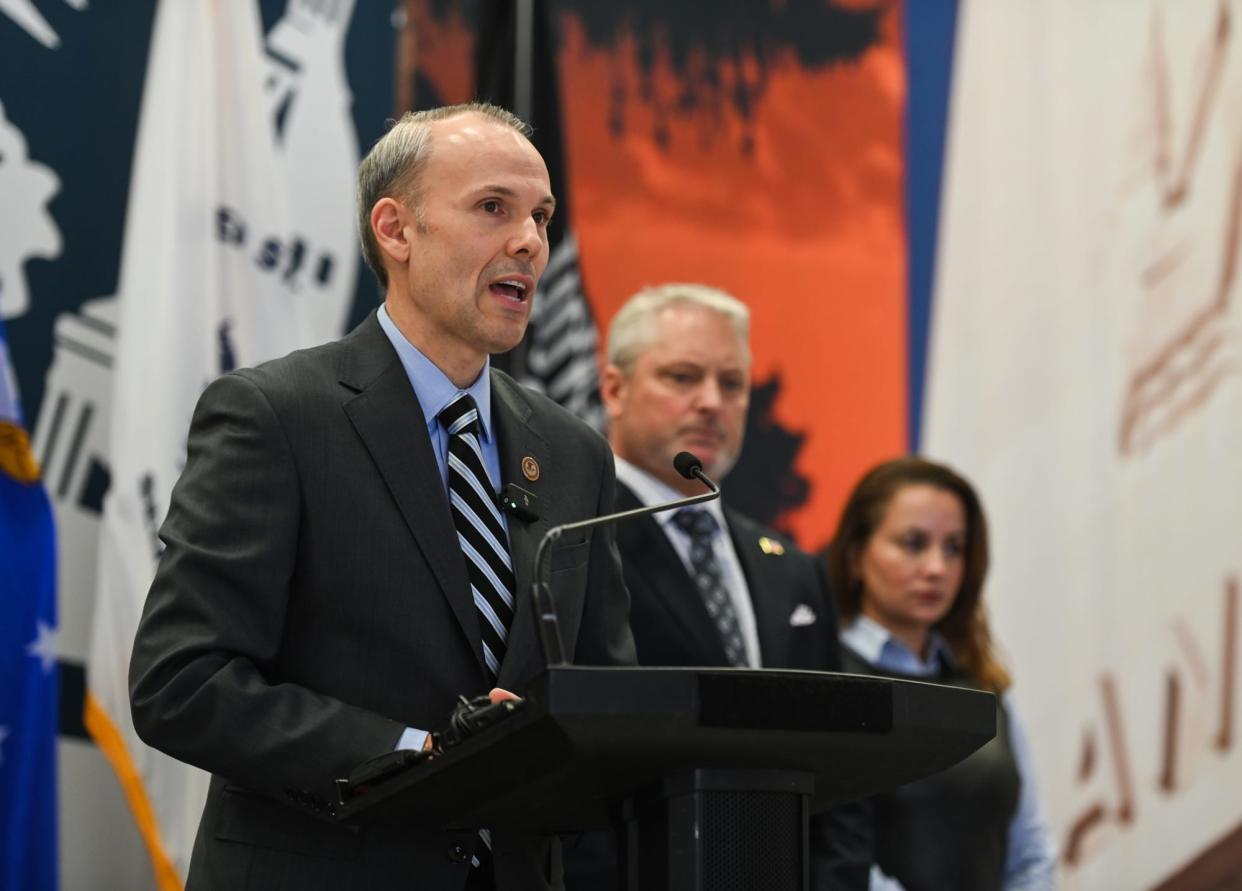Feds will renew summer program aimed at reducing gun violence in Lansing

- Oops!Something went wrong.Please try again later.
LANSING — When the calendar flips over in a few days, federal prosecutors in the western half of the state will renew their focus on a particular kind of gun violence.
Mark Totten, the U.S. Attorney for the Western District of Michigan, whose jurisdiction covers Lansing, said his office is going to "repeat and strengthen" an initiative he announced in May.
The "Safe Summer 2023" initiative ran through the end of September as a cooperative effort by federal, state and local law enforcement agencies. The idea was for law enforcement in Michigan to work more closely on cases in which a firearm was used in multiple shootings.
Totten's office agreed to help local law enforcement analyze firearms seized during criminal cases and as well as to prosecute cases in which firearms were connected to a previous shooting.
Focusing on such cases is the best way to stop the shootings that drive the gun violence in communities throughout the state and country, Totten told the State Journal.
"In any particular place, and Lansing is no exception, there is always a very short list of people who are driving up violent crime," he said. "Everybody reads about it. Everybody sees it. Everybody feels it. But the people who are actually driving that, it is a short list."
When Totten announced the initiative in 2023, he said he was prepared to add "additional resources" to aid in prosecuting gun crimes, but it was unclear whether the initiative would cause more firearms to be submitted for ballistics testing or how many cases might be shifted to federal court because of it.
Results from the summer initiative have taken longer than he had hoped, in part because of how long it takes for firearm and ballistic testing to be completed. Another reason Totten said he couldn't point to a specific number of cases from the initiative is that many are still making their way through the court system, and a firearm's history in other crimes sometimes can't be detailed until sentencing.
But he said approaches like the one in the summer help keep his office focused on the right cases to reduce gun violence.
"If somebody's carrying a gun where there is evidence that shells from that gun were left at the scene of a crime, then there's a good chance that this person is one of those people who is helping drive the crime," he said.
And while his office has limited resources, what Totten can bring to the table with local law enforcement is the threat of increased sentences. The same conduct — illegally possessing a firearm or kidnapping, for example — prosecuted in federal court can lead to longer prison sentences than might be the case in state court.
Totten's "Safe Summer" initiative was far from the only effort to combat gun violence in Lansing or the state.
When Ingham County Prosecuting Attorney John Dewane took office at the start of the year, he changed how the office addresses gun cases, which led to an significant increase in one particular charge: felony firearm.
Prosecutors can bring the charge if someone was in possession of a firearm while committing another crime. It carries a mandatory two-year prison sentence that must be served before any other sentence in the case, essentially increasing someone's time in prison by two years.
Dewane recently said his office used the felony firearm charge 447 times in 2023, up from 95 the year prior, before Carol Siemon stepped down as prosecutor.
In 2021, Siemon said her office would limit the use of the charge, saying it was meant as a deterrent to people carrying guns, but in practice its use had disproportionately impacted Black people. Local law enforcement criticized Siemon for her decision.
Dewane has pointed to efforts by community violence intervention groups like Advance Peace that work separately from law enforcement. Groups like Advance Peace identity people most likely to take part in retaliatory gun violence and then work with them to leave violence behind.
Ballistics testing isn't the only tool federal law enforcement has to track firearms used during crimes. The Bureau of Alcohol, Tobacco, Firearms and Explosives can also track the sale and possession of specific firearms. Those trace reports can shed more light on Michigan's crime guns, even if the data publicly available is far more limited than what law enforcement gets.
In 2022, the ATF ran 10,145 trace reports for firearms recovered in the state. More than half of those weapons — 6,836 — came from within Michigan, with about 200 firearms each entering the state from Ohio and Illinois.
Lansing had the eighth-most recoveries in the state with 163, following Kalamazoo with 179, but significantly behind Detroit's 5,776 and Flint's 641.
Reporter Ken Palmer contributed to this story. Contact reporter Matt Mencarini at 517-377-1026 or mjmencarini@lsj.com.
This article originally appeared on Lansing State Journal: Feds will renew effort aimed at reducing gun violence in Lansing

